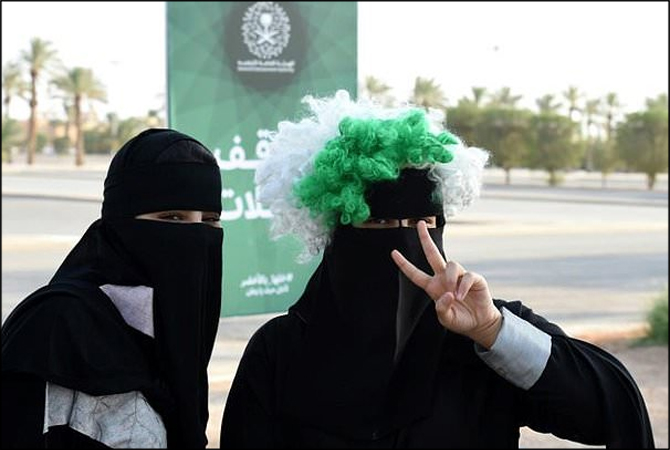In a first, women throng Saudi stadium for national day
- By AFP -
- Sep 23, 2017

RIYADH: Hundreds of women thronged a sports stadium for the first time to mark Saudi Arabia’s national day Saturday, celebrated across the conservative kingdom with a raucous display of concerts, folk dance and fireworks.
The presence of women at the King Fahd stadium marks a departure from previous celebrations in the Gulf kingdom where they are effectively barred from sports arenas by strict rules on segregation of the sexes in public.
Women were allowed to enter the stadium, a previously male-only venue used mostly for football matches, with their families and seated separately from single men to watch a play on Saudi history.
“We hope in the future that there will be no restrictions on our entrance to the stadium,” said Um Abdulrahman, a woman from the northwestern city of Tabuk.
“For many years ago I have hoped that women will be given the same rights as men.”

Ultra-conservative Saudi Arabia has some of the world’s tightest restrictions on women and is the only country where they are not allowed to drive, despite ambitious government reforms aimed at boosting female employment.
Under the country’s guardianship system, a male family member — normally the father, husband or brother — must grant permission for a woman’s study, travel and other activities.
But the kingdom appears to be relaxing some norms as part of its “Vision 2030” plan for economic and social reforms conceived by powerful Crown Prince Mohammed bin Salman.

Drums, poetry, dance
The national day celebration coincides with a crucial time for Saudi Arabia, which is in a battle for regional influence with arch-rival Iran, bogged down in a controversial military intervention in neighbouring Yemen and at loggerheads with fellow US Gulf ally Qatar.
Iconic buildings in Riyadh were bathed in green light and stereos blared patriotic songs as revellers raced through the streets in cars bedecked with the national flag.
With drumming and poetry, traditional sword dancers celebrating the warrior tradition of Saudi Arabia strode through Tahlia Street, an upscale shopping strip in the heart of Riyadh.
“On this great occasion, we feel that the kingdom has become an important state with a pioneering role at the regional and international levels,” Prince Mohammed said in a speech earlier cited by the official Saudi Press Agency.

The 32-year-old prince is set to be the first millennial to occupy the throne in a country where half the population is under 25, although the timing of his ascension remains unknown.
Already viewed as the de facto ruler controlling all the major levers of government, from defence to the economy, the prince is seen as stamping out traces of internal dissent before any formal transfer of power from his 81-year-old father King Salman.

Asserting power
Authorities this month arrested around two dozen people, including influential clerics, in what activists decried as a coordinated crackdown.
Analysts say many of those detained are resistant to Prince Mohammed’s aggressive foreign policy that includes the boycott of Qatar as well as some of his bold reforms, dubbed Vision 2030, which include privatising state assets and cutting subsidies.
“On this cherished anniversary of the unification of our dear country, the kingdom of Saudi Arabia, we assert its effective and influential status,” the prince said in his speech.

“The kingdom is an active member in the G20, the world’s strongest 20 economies, and is keen to achieve the kingdom’s Vision 2030 that represents the beginning of a new phase of hard work for a better future, with the same Islamic values.”
The kingdom’s General Entertainment Authority is hosting 27 events across 17 cities to celebrate national day, including concerts, laser shows and firework displays.
Saudi chefs in the Red Sea city of Jeddah broke the Guinness world record for baking the biggest marble cake, with a green icing to mark national day, the government said.

